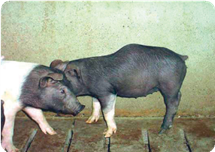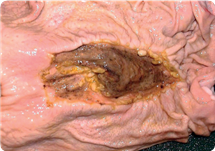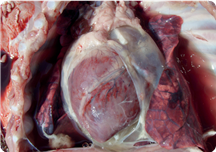Vitamins and trace elements play a very important role in different physiological processes in pigs. Requirements of these elements will depend on the age, the physiological status (pregnancy, production, lactation) and the feed (conservation, composition, processing). We will only explain about the role of vitamins in this article.
Basically, there are 2 main categories of vitamins: water-soluble and fat-soluble vitamins.

Water-soluble vitamins
The water-soluble vitamins are Vit C and Vit B. These vitamins dissolve in water and have a low toxicity due to the extra elimination rate in urine.
Vitamin B
Vit B are co-enzymes in several enzymatic reactions in the body, causing few specific symptoms in case of deficiency. The B-vitamins are available from animal and vegetable sources as well as from synthesis by micro- organisms (bacteria) in the colon (pig). Since they are absorbed in the small intestines, pigs have little advantage of this synthesis in colon except in case of coprofagy.
Vitamin C
Vit C is important for immunity and in stress situations. Extra Vit C stimulates the growth of pigs.
Fat-soluble vitamins
The fat-soluble vitamins are Vit A, D, E and K. They dissolve in fat and are stored in the liver and fat tissue. These vitamins have a higher toxicity due to the delayed elimination rate. Several studies show that fat soluble vitamins have a positive effect on the immune and/or reproduction and/or musculoskeletal system.
Vitamin A
Vit A plays a role in an increased fertility. It stimulates the spermatogenesis in boars. In sows, it improves the ovulation and implantation of the ovum. The growth and differentiation of embryonic tissues can be stimulated by Vit A supplementation. Therefore, it is useful to give sows an injectable Vitamin A preparation before weaning of the piglets.
Vitamin D
Vit D is an important vitamin for an optimal bone mineralization, muscle development and immune stimulation. In lactating sows, it is important for having an optimal colostrum and milk production. Colostrum intake is essential for newborn piglets to support their immune system. Vit D deficiency in growing pigs results in poor bone strength that can lead to bone fractures, hypocalcemic paresis, tremors, lameness and rickets. (see Fig. 2)
Fig 2: Kyphose

Vitamin E
Vit E helps to maintain the integral structure of muscles in the digestive and reproductive systems. It acts as a tissue antioxidant and will protect polyunsaturated fatty acids and other compounds from oxidation by free radicals. Vit E also increases the efficiency of the immune system. Piglets can be born with low blood levels of Vit E due to a poor transfer across the placenta during pregnancy. Colostrum contains a lot of Vit E. This amount can be increased by an injection around 14 – 21 days before farrowing. Piglets that have received a suitable dose of colos- trum of a sow supplemented with Vit E will be less susceptible to Vit E deficiency during suckling and postweaning periods. Piglet with a Vit E deficiency are more challenged by infectious agents like Streptococcus suis, Glässer disease, APP, PCV2, …
Vit E is also closely related to Selenium. The less selenium in the diet, the greater the requirement for vitamin E. Common vitamin E and Se related diseases are gastric ulcers, muscular dystrophy, Mulberry heart disease and reproduction disorders. Gastric ulcers are often stress-mediated. The incidence increases when vitamine E levels are low. (See Fig. 3)
Fig. 3: gastric ulcer

Muscular dystrophy is characterised by oedema or fluid around tissues muscles (PSE). Mulberry heart disease (see Fig. 4) is characterised by sudden death in healthy, rapidly growing pigs.
Fig 4: Mulberry heart disease

Reproductive disorders related to Vitamin E deficiency are characterised in disturbed sperm production and ovarian malfunction.
Vitamin K
Vit K is necessary to maintain normal blood clotting mechanisms. A deficiency causes haemorrhages throughout the tissues. Low levels of Vit K have implicated in navel bleeding in newborn piglets.
Conclusion
Vitamins and trace elements have a great impact on the pig’s health status. Deficiency of these vitamins and trace elements can lead to fertility and/or immunity and/or musculoskeletal disorders.
Written by Frank Vermeiren, DVM, Technical service & Product manager Kela
Sources:
- Picture Kyphosis ( fig 2): Maternal Diets Deficient in Vitamin D Increase the Risk of Kyphosis in Offspring: A Novel Kyphotic
- Porcine Model, 2018 March 07
- Halanski MA, Hildahl B, Amundson LA, Leiferman E, Gendron-Fitzpatrick A, Chaudhary R, Hartwig-Stokes HM, McCabe R, Lenhart R, Chin M,Birstler J, Crenshaw TD
- Picture gastric ulcer ( fig 3): Disorders of the stomach / James Cook University/ Veterinary Science/ Australia
- Picture Mulberry Heart Disease ( fig 4): Butch Baker/DVM